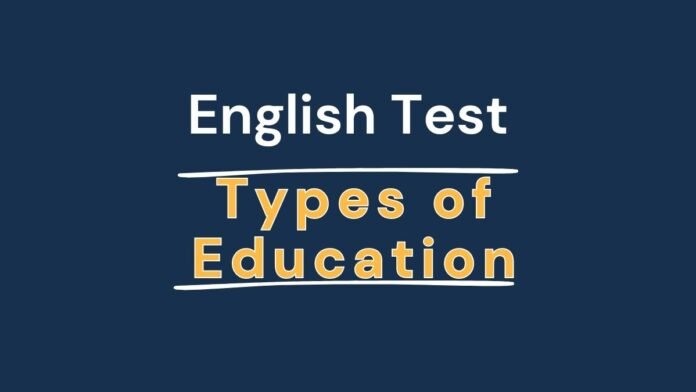“English Test – Types of Education” will test your knowledge of English, including Reading, Grammar, Functions, and Writing. Answers are included.
———————–
1 – Numerous definitions exist for the term education. Some of the older ones are some of better ones. For me, education means learning knowledge, skills, and attitudes. The most important of these is learning how to learn. Learning means deciding about your own lifestyle. Teaching, by itself, does not constitute learning; neither does passive listening. Learners must decide to incorporate any knowledge, skill, or attitude into their own set of values and behaviors (lifestyle), or the learning is not meaningful. Learning happens outside the classroom as well as within. Some learning results from teachers, and some do not. Some learning is intended some is accidental.
Three types of education
2 – Most of the general population assumes that education and schooling are interchangeable terms. Many educators seem to feel that any education that happens outside school is somehow inferior, usually dubious, and certainly uncontrolled. Other educators point out that learning takes place inside and outside of classrooms. I believe that learning occurs in formal, non-formal, and informal educational settings and that the learning experience can be equally powerful in each of those settings.
3 – Formal education is properly associated with schools. A more precise definition is, by Coombs(1973), “the hierarchically structured, chronologically graded educational system running from primary school through the university and including, in addition to general academic studies, a variety of specialized programs and institutions for full-time technical and professional training.”
4 – Non-formal (NFE) has been defined (Kleis. 1973. p. 6) as any intentional and systematic educational program (usually outside of traditional schooling) in which content is adapted to the unique needs of the students (or unique situations) in order to maximize learning and minimize other elements which often occupy formal school teachers. Non-formal education is more learner-centered than most formal education. It has to be. Learners can leave anytime they are not motivated. NFE tends to emphasize a cafeteria curriculum (options, choices) rather than the prescribed, sequential curriculum found in schools. In NFE, human relationships are more informal (roles of teachers and students are less rigid and often switch) than in schools where student-teacher and teacher-administrator roles are hierarchical and seldom change in the short term. NFE focuses on practical skills and knowledge, while schools often focus on information that may have delayed application. Overall, NFEs have a lower level of structure (and therefore more flexibility) than schools.
5 – Even less structured is informal education which deals with everyday experiences which are not planned or organized (incidental learning). When these experiences are interpreted or explained by elders or peers, they constitute informal education (Kleis. 1973.).
6 – Some examples will help clarify formal, non-formal, and informal education. Formal education occurs in a typical public high school classroom. Non-formal education occurs with such organizations as evening classes or vocational training workshops, which are less structured than schools, allowing youth more choices, providing less curricular sequencing, and enforcing it even less. Learning is controlled by the learners, who may drop out at any time without penalties. As a result, educators must emphasize those skills, knowledge, and attitudes that are desired by the learners. Content is more practical, therefore, and responsibility for discipline shifts from teacher to learner. An example of informal education is when infants and young children are learning to speak. They learn by listening and imitating. Their trial and error efforts are augmented by parents, siblings, and friends who encourage correct sounds and spontaneously correct errors.
7 – Extension education is non-formal education with only a few exceptions. Although extension agents may take advantage of learning opportunities that arise serendipitously, to call extension work “informal education” is inaccurate. A secondary vocational agriculture program is difficult to fit into one of the three categories because it has elements of all three. Work in class, which is tested and graded, is typical of formal education. Much of the FFA and supervised occupational experience activities are typical of non-formal education. When students’ everyday experiences are interpreted and augmented by their peers or parents, this is typical of informal education. All three types of education provide powerful learning opportunities. The most effective teacher is one who allows and helps learning take place during situations that fit all three types of education. This may be done intentionally or instinctively.
8 – While formal and non-formal education are different, they are not opposites. Both emphasize organized and intentional learning. Both involve structure, professional educators, and choices by learners. Responsibility for learning is shared among educators and learners. The differences are more a matter of degree in each of these types of education.
I. COMPREHENSION
A. ANSWER THESE QUESTIONS FROM THE TEXT
- What does education mean for the writer?
- What do learners have to do in order that their learning is meaningful?
- Where does non-formal education take place?
- When does experience become informal education?
- Where does formal education take place?
- According to the writer, who is a successful teacher?
B. ARE THESE SENTENCES TRUE OR FALSE
- Formal and non-formal education are opposites
- Non-formal education focuses more on the teacher
- Learners in non-formal education must not drop out
- Secondary vocational agriculture school involves all types of education
C. FIND IN THE TEXT WORDS WHICH MEAN ALMOST THE SAME AS
- Teachers (paragraph 2):……………
- Insists (paragraph 4): ……………
- Education that takes place in everyday life (paragraph 5): …………….
II. GRAMMAR
A. PUT THE VERBS INTO THE CORRECT FORM (GERUND OR INFINITIVE)
- You ought (revise) ………………………. your lessons before you come to class
- He used (smoke) ……………………. but now he stopped
- Would you mind (take) …………………..that bag to Emily
- He was used (eat) ……………………… lots of chocolates
- Students have (respect) ………………… the school rules
B. CHANGE THE VERBS TO THE PAST (PERFECT OR SIMPLE )
- Jill (phone) …………….. her dad at work before she (leave) …………. for the trip.
- The secretary (type) ……………. the documents, before she (send) ……………them by fax.
- The man (not/feed) ……………… the cat after he (come) ………….. home.
- When I (see) ……………the movie, I (already/do) ……………….. my homework.
- After Fred (spend) ……………… his holiday in Italy, he (want) ……………… to learn Italian.
- He (not/have) ………………… an excellent mark in the test, because he (be) ………………… always absent.
- He (already/hide) ………………….. the printer, when he (leave) …………………the office.
- Before he (retire) ……………. he (work) ……………… for many companies.
III. FUNCTIONS
A. WHAT DO THESE SENTENCES EXPRESS
- “Do you mean….?”………………………………
- “I am afraid, but I can’t do it”…………………………………
- “I didn’t quite see what you’re getting at”……………………………………..
- “Could you close the door, please”………………………………..
IV. WRITING
DO TASK 1 AND 2
TASK 1: Complete the following paragraph about your primary school. (4 pts)
I still remember a lot of things about my primary school. ……………………………….
TASK 2: (6 pts)
You have seen the following advertisement on a website:
Summer Jobs
We need people to work in our restaurant as waiters, cooks, and cleaners.
If you are interested, write an email to: staff@basmarestaurant.com
Mr. Naji is the manager of the restaurant. Write him an email to apply for one of the jobs.
Include personal information, qualifications, work experience, personal skills, and interests.
Dear Mr. Naji,
…………………………………………
Key Answers to English Test – Types of Education
I. COMPREHENSION
A. ANSWER THESE QUESTIONS FROM THE TEXT
- Education means learning knowledge, skills, and attitudes. The most important of these is learning how to learn.
- Learners must decide to incorporate any knowledge, skill, or attitude into their own set of values and behaviors (lifestyle)
- usually outside of traditional schooling OR in evening classes or vocational training workshops
- When these experiences are interpreted or explained by elders or peers, they constitute informal education.
- Formal education occurs in a typical public high school classroom.
- The most effective teacher is one who allows and helps learning to take place during situations that fit all three types of education.
B. ARE THESE SENTENCES TRUE OR FALSE
- False .” While formal and non-formal education are different, they are not opposites.”
- False. “Non-formal education is more learner-centered.”
- False. Learners can leave anytime they are not motivated.
- True . “it has elements of all three.”
C. FIND IN THE TEXT WORDS WHICH MEAN ALMOST THE SAME AS
- Teachers (paragraph 2): educators
- Insists (paragraph 4): focuses
- Education that takes place in everyday life (paragraph 5): informal education
II. GRAMMAR
A. PUT THE VERBS INTO THE CORRECT FORM (GERUND OR INFINITIVE)
- You ought (revise) to revise your lessons before you come to class.
- He used (smoke) to smoke, but now he stopped.
- Would you mind (take) taking that bag to Emily?
- He was used (eat) to eating lots of chocolates.
- Students have (respect) to respect the school rules.
B. CHANGE THE VERBS TO THE PAST (PERFECT OR SIMPLE )
- Jill (phone) had phoned her dad at work before she (leave) left for the trip.
- The secretary (type) had typed the documents before she (send) sent them by fax.
- The man (not/feed) didn’t feed the cat after he (come) had come home.
- When I (see) saw the movie, I (already/do) had already done my homework.
- After Fred (spend) had spent his holiday in Italy, he (want) wanted to learn Italian.
- He (not/have) didn’t have an excellent mark on the test because he (be) had always been absent.
- He (already/hide) had already hidden the printer when he (leave) left the office.
- Before he (retire) retired, he (work) had worked for many companies.
III. FUNCTIONS
A. WHAT DO THESE SENTENCES EXPRESS
- Asking for clarification.
- Declining request.
- Expressing a lack of understanding.
- Making a request.



